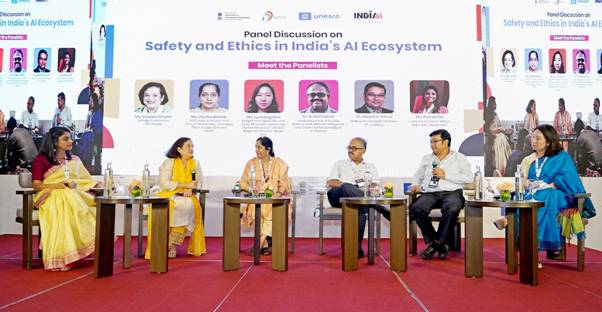UNESCO and MeitY Host the 5th Stakeholder Consultation on AI Readiness Assessment Methodology (RAM) in India
UNESCO and MeitY Host the 5th Stakeholder Consultation on AI Readiness Assessment Methodology (RAM) in India
The UNESCO Regional Office for South Asia, in collaboration with the IndiaAI Mission, and Ikigai Law as the implementing partner, organized a multi-stakeholder consultation on AI Readiness Assessment Methodology (RAM) in India, at the Shangri-La Eros Hotel, New Delhi on 3rd June 2025.
This was the final in a series of five stakeholder consultations under the AI RAM initiative by UNESCO and IndiaAI Mission, MeitY, following earlier sessions in New Delhi, Bangalore, Hyderabad, and Guwahati. The initiative aims to develop an India-specific AI policy report that maps strengths, identifies growth opportunities and offers actionable recommendation for the ethical and responsible adoption of AI across sectors. The AI RAM acts as a diagnostic tool to support governments in strengthening regulatory and institutional capacity in AI.

This initiative comes at a crucial moment as India embarks on its ambitious IndiaAI Mission. Central to the mission is the Safe and Trusted AI pillar, which underscores the commitment to ensuring safety, accountability, and ethical practices in AI development and deployment. By promoting indigenous frameworks, robust governance tools, and self-assessment guidelines, the mission aims to empower innovators and democratize AI benefits across sectors.
Highlights from the Consultation
The event began with opening remarks by Mr. Tim Curtis, Director, UNESCO Regional Office for South Asia, followed by a keynote speech by Mr. Abhishek Singh, Additional Secretary, MeitY, CEO, IndiaAI Mission, and Director General, National Informatics Centre (NIC). This was followed by a panel discussion on “Safety and Ethics in India’s AI Ecosystem” featuring senior government officials, UNESCO and experts.
The consultation featured over 200 experts from the government, academia, private sector, and civil society, in discussions that provided actionable insights into responsible AI adoption:
In his opening remarks, Mr. Tim Curtis, Director, UNESCO Regional Office for South Asia underscored the importance of adopting an ‘ethics-by-design’ approach to AI development, noting that true inclusivity requires not just functionality but the integration of core ethical values from the outset. He also reaffirmed UNESCO’s support for India’s vision of an AI ecosystem that is inclusive, transparent, and grounded in trust.
In his keynote speech, Mr. Abhishek Singh, Additional Secretary, MeitY, CEO, IndiaAI Mission, and Director General, National Informatics Centre (NIC), highlighted India’s balanced, pro-innovation approach to AI aimed at building AI in India and making it work for India through safe, trustworthy applications. He also outlined key initiatives under the IndiaAI Mission, including the AI Kosh platform for datasets, the shortlisting of companies to develop foundation models, and support for Responsible AI projects under the Safe and Trusted AI pillar.
Panel Discussion: The panel comprised of Ms. Debjani Ghosh (Distinguished Fellow, NITI Aayog), Ms. Kavita Bhatia (COO, IndiaAI Mission and Group Coordinator, Emerging Technologies Division, MeitY), Ms. Eunsong Kim (Programme Specialist, and Chief of Section, Social and Human Sciences, UNESCO Regional Office for South Asia), Dr. B. Ravindran (Head, Department of Data Science and Artificial Intelligence (DSAI), and Centre for Responsible AI (CeRAI), IIT-Madras), and Dr. Mayank Vatsa (Professor, Computer Science, IIT- Jodhpur). They discussed emerging policy initiatives, regulatory frameworks, and governance mechanisms being shaped to support ethical and responsible AI adoption in India. Ms. Debjani Ghosh emphasized the industry’s critical role in developing responsible AI and described the need to balance AI’s vast potential with its inherent risks as the greatest challenge of our time. Ms. Kavita Bhatia highlighted the collaborative spirit of the IndiaAI Mission, where government, experts, and industry partners work together to foster both responsibility and innovation in AI development.
Breakout sessions facilitated in-depth discussions across key areas, including governance, infrastructure, workforce readiness, and sectoral AI adoption. Additionally, there was a dedicated breakout session on youth participation in AI development and governance. Participants provided valuable inputs, shaping the foundation for India’s AI policy roadmap.
About RAM (Readiness Assessment Methodology)
The Readiness Assessment Methodology (RAM) includes a range of quantitative and qualitative questions designed to gather information about different dimensions related to a country’s AI ecosystem, including the legal and regulatory, social and cultural, economic, scientific and educational, and technological and infrastructural dimensions. Each dimension features a series of quantitative and qualitative assessment questions, setting the RAM apart from other existing readiness assessment tools.
The implementation of the RAM is adapted to the unique circumstances and characteristics of the country, as well as the budget available for the project. The RAM is expected to be carried out by an independent consultant or research organization, supported by a national team comprising a variety of stakeholders, such as personnel from the UNESCO Secretariat and UNESCO National Commission, as well as representatives from the country’s government, the academic community, civil society and the private sector, among others.
UNESCO and MeitY remain committed to translating the principles of UNESCO’s Global Recommendations into concrete policy actions tailored to India’s unique AI ecosystem. The AI RAM sessions will continue across India, fostering multi-stakeholder engagement to advance inclusive, responsible, and sustainable AI governance.
For further details, please contact Mr. Abhishek Aggarwal, Scientist ‘D’, MeitY at abhi.a[at]gov[dot]in, Ms. Eunsong Kim, Chief of Social and Human Sciences, UNESCO South Asia Regional Office at e.kim@unesco.org, or Sindhuja Khajuria, Communications and Public Relations Officer, UNESCO South Asia Regional Office at s.khajuria@unesco.org.